 February 4: Exodus 10 - The Power of God and the Hardness of Pharaoh’s Heart
February 4: Exodus 10 - The Power of God and the Hardness of Pharaoh’s Heart
 Introduction
Introduction
As we open the book of Exodus chapter 10, we step into a world where mighty, divine plagues wreak havoc upon Egypt in response to Pharaoh’s stubbornness. These catastrophic events serve as a resounding testament to the unchallenged power of God.
 Locusts and Darkness, Symbols of Judgment
Locusts and Darkness, Symbols of Judgment
The chapter highlights the destructive locust plague – an event of unparalleled scale in Egypt (Exodus 10:14). As if the previously experienced seven plagues were not crippling enough, the invasion of locusts consumes everything that’s left. Pharaoh’s futile resistance reflects his hardened heart against God’s commands.
![]() Key Verse: Exodus 10:3 “So Moses and Aaron went to Pharaoh and said to him, “This is what the LORD, the God of the Hebrews, says: ‘How long will you refuse to submit to me? Let my people go, so that they can worship me.'”
Key Verse: Exodus 10:3 “So Moses and Aaron went to Pharaoh and said to him, “This is what the LORD, the God of the Hebrews, says: ‘How long will you refuse to submit to me? Let my people go, so that they can worship me.'”
Following the locusts, God engulfs Egypt in darkness for three days (Exodus 10:21-23), reflecting total chaos and loss, while the Israelites have light.
 Key Themes and Reflections
Key Themes and Reflections
God’s Power: The sheer magnitude and severity of the plagues highlight God’s vast, unstoppable power. No entity, no matter how mighty, can stand in defiance of God’s will.
The Consequences of Hard-heartedness: Pharaoh’s defiance and refusal to obey God’s commands lead to persistent suffering. It reveals that liberty can’t exist without obedience.
 Today’s Application
Today’s Application
We can draw important lessons from Exodus 10. In the face of God’s power, stubbornness and refusal to obey His commands can only lead to trouble. We must be open to God’s voice in our lives and be willing to submit to His will, even when it’s difficult.
 Hidden Gem
Hidden Gem
It’s interesting to note that despite all the darkness in Egypt, there was light in the homes of the Israelites, symbolizing God’s favor and protection.
 Reflective Q&A
Reflective Q&A
![]() Why do you think God continued to harden Pharaoh’s heart?
Why do you think God continued to harden Pharaoh’s heart?
A: It’s possible that God wanted to display His power to the world, to leave no doubt in the minds of the Egyptians and Israelites alike about who was the true God.
![]() What can we learn from the Plague of Locusts and the Darkness?
What can we learn from the Plague of Locusts and the Darkness?
A: These plagues serve as symbols of God’s judgment against disobedience and show that God’s will and commands cannot be thwarted.
![]() How can we apply the lessons from Exodus 10 to our own lives?
How can we apply the lessons from Exodus 10 to our own lives?
A: We must endeavor to be receptive to God’s guidance in our lives and not to harden our hearts when His will is echoed to us.
 Join the Discussion
Join the Discussion
We want to hear your thoughts! Share your reflections, insights, and questions about Exodus 10. Remember, our community learns better when we learn together.
![]() See You Tomorrow in Exodus 11-12: We’ll read about the final plague and the first Passover.
See You Tomorrow in Exodus 11-12: We’ll read about the final plague and the first Passover.
Final Thoughts
Exodus 10 teaches us about the power of God and the dangers of hard-heartedness. Let’s remember not to let our own stubbornness or pride get in the way of God’s divine plans.
 Subscribe to our newsletter
Subscribe to our newsletter
Subscribe to our newsletter at newsletter.aignitescripture.com for daily readings and exclusive content.
From thoughtful reflections to community highlights, get everything delivered straight to your inbox. Secure your spot today and be a part of our growing community!
